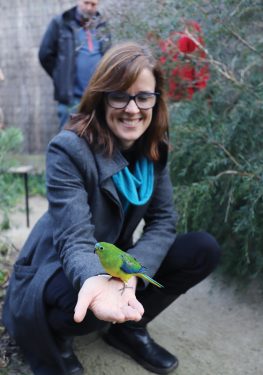
THE Western Port Biosphere Reserve Foundation wants people to “think about how acting logically” could protect the environment and endangered species.
Speaking after the release of Australia’s 2021 State of the Environment Report – a review completed by scientists last year but held back by the Morrison government until after the federal election – foundation chief executive Mel Barker said saving species should start “in our own backyard”.
“Australians concerned about the dramatic losses of mammals, birds and fish and the alarming replacement of native plants with introduced species can make valuable contributions to solutions by acting locally,” she said.
The environment report paints a sad picture of massive species loss in Australia, with federal Environment Minister Tanya Plibersek labelling evidence of ecosystem change impacted by climate change and human behaviour as “shocking”.
Barker says that rather than feeling overwhelmed by the scale of problems associated with climate change and biodiversity loss, community collaboration can be a “great enabler”.
“Recently we signed an agreement with the award-winning Moonlit Sanctuary at Pearcedale to collaborate on saving species and other environmental initiatives,” she said.
“It was based on our very positive participation over the past year in its team’s program to restore populations of the critically endangered orange-bellied parrot, which migrates between south-eastern Victoria and Tasmania.”
Barker said the biosphere foundation was also pleased to receive money in May from Regional Roads Victoria to evaluate the design and effectiveness of road crossings to protect the endangered southern brown bandicoot and will work with community partners to deliver the project.
“We also have projects funded and ready to commence to support the restoration of native plants, creating corridors and habitat to optimise the biodiversity necessary to support our plants and animals,” she said.
“We would encourage landholders throughout the biosphere reserve to consider future plantings of species native to the reserve.
“Specialist native nurseries able to advise on selecting and growing these plants abound through the region, including one at Willum Warrain Aboriginal Association in Hastings.”
The Western Port Biosphere Reserve, which includes the entire Mornington Peninsula, is substantially comprised of private holdings, which Barker says makes “the whole of community” involvement a vital part of strategies to help mitigate against climate change and biodiversity loss.
The reserve is one of 738 places in 134 countries recognised by the United Nations for the uniqueness and importance of its biodiversity. Biosphere reserves promote solutions to enable people to live in harmony with the environment.
They also advocate for the protection of environmental assets and for sustainable development through research, education, which informs discussion and solutions aligned with society’s ability to cope with change.
The UN’s sustainable development goals form a centrepiece of the advocacy and programs undertaken for the Western Port Biosphere Reserve Foundation. Programs include partnering with industry and government on projects to achieve better environmental outcomes while maintaining or improving their performance.